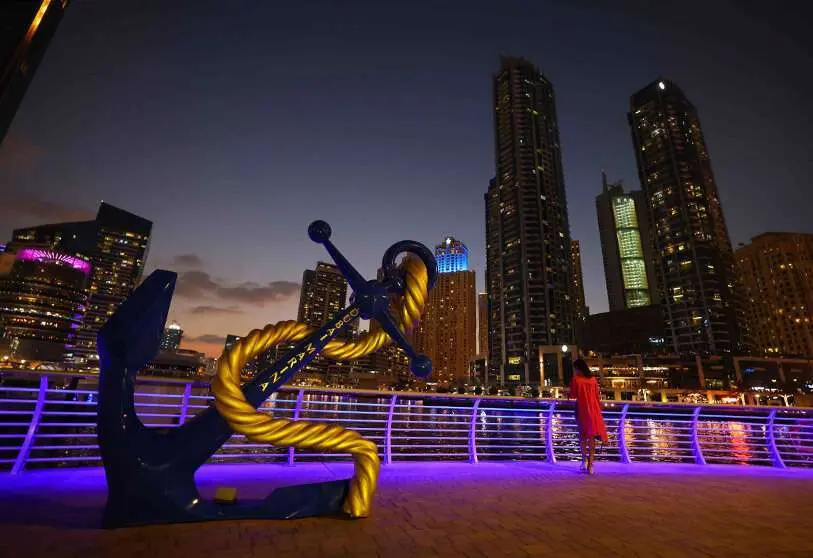Can alternative segments restart recovery in the face of COVID-19 tourism in the Gulf?

With Saudi Arabia's flagship Red Sea tourism project securing $3.8 billion in green funding, several governments in the Gulf region are looking to new alternative tourism models to boost recovery from the pandemic, with an emphasis on eco-friendly options and 'staycations'.
Both to restart its tourism industry and as part of its drive to diversify the economy away from hydrocarbons, Saudi Arabia is developing several major green tourism projects.
In April, the Red Sea Development Company, which is owned by the Kingdom's Public Investment Fund, announced that it had raised $3.8 billion for the Red Sea Project through the first riyal-denominated green finance credit line.

The project is being built on a 28,000 square kilometre site containing 90 islands. It is scheduled to welcome its first visitors in 2022, and when fully operational in 2030 will feature 50 hotels, a luxury marina and a variety of entertainment and leisure facilities.
The site's entire transport network, including a new airport, will be powered by renewable energy.
Four banks in Saudi Arabia - Banque Saudi Fransi, Riyad Bank, SABB and Saudi National Bank - helped finance the construction of the project, while HSBC acted as green loan coordinator.

The Gulf region as a whole is increasingly embracing innovative and sustainable approaches to tourism.
"The demand for local, greener and eco-friendly tourism has grown exponentially, both in Europe and the GCC," Chirag Kanabar, managing director of Pine Wood Building Materials Trading, a company focused on sustainable and eco-friendly modular construction, told OBG. "This is in line with pandemic-related preferences for increased social distance and privacy."
The United Arab Emirates, for example, has seen a significant increase in 'glamping', whereby tourists can enjoy the camping experience while having access to facilities that are more luxurious than those available at traditional campsites.

Glamping is part of a wider shift towards the so-called home holiday model. With flights grounded and borders closed as a result of COVID-19, last year many people around the world took their holidays in their home country. This year, even though vaccination programmes are being implemented and borders gradually reopened around the world, international tourism is expected to recover slowly and holidays at home are leading the way.
In 2018, market research company Aritzon predicted that the global glamping industry would reach approximately US$1bn in revenue by 2023, growing at a compound annual growth rate (CAGR) of 6% over the period.

The coronavirus pandemic has served to accelerate the growth of the sector. According to a report published in March by Grand View Research, global glamping will be worth US$5.4 billion by 2028, at a compound annual rate of 14.1% between 2021 and 2028.
The UAE is particularly well positioned to capitalise on this trend, with its variety of natural landscapes close to urban centres offering varied cultural attractions.

A flagship project is Sharjah's Kingfisher Retreat, a tented hotel that won the Luxury Beach Retreat Middle East 2020 award at the World Luxury Hotel Awards.
"This is tangible proof that the emirate's eco-tourism model, based on environmentally friendly structures, is working, which is why the government is looking to expand it to other locations within its territory," David Patrick Court, a consultant with Bushtec Creations, a manufacturer of luxury tents for resorts and glamping providers, told OBG.

Meanwhile, the recently announced Dubai Urban Master Plan 2040 places a strong emphasis on sustainability.
In a significant move, Glampitect, a leading British green resort design consultancy, announced in March that it was opening a site in Dubai.
Moreover, at the Arabian Travel Market 2021, which was held at the Dubai World Trade Center from 16-19 May, the Ras Al Khaimah Tourism Development Authority (RAKTDA) announced more than 20 sustainable tourism development initiatives across the emirate.
In addition to glamping sites, these will include eco-friendly hotels and experiential offerings.
"The GCC region is noted for providing experiential travel opportunities, given its rich history and culture. One possible way forward for the region to take full advantage of this could be for individual countries and emirates to coordinate with each other in an approach similar to that adopted by Southeast Asian nations, whereby each can specialise in its distinctive value proposition," Tommy Lai, chief executive officer of Gulf-based GHM Hotels, told OBG.

"For the region, it is important to promote the idea that ecotourism is multifaceted and not only associated with rainforests and tropical environments. The multifaceted potential of ecotourism can be developed based on the unique habitats in the GCC, including its deserts," Lai added.
Echoing these sentiments, Sanjiv Malhotra, executive vice president of Shaza Hotels, told OBG: "In the UAE, each emirate offers a distinct experience. Sharjah has a strong focus on positioning itself as a heritage and cultural capital, based on an identity linked to education. It is also committed to its natural assets, from the Gulf coast to Khorfakkan.

RAKTDA said its plan reflects Ras Al-Khaimah's new destination strategy, which focuses on nature, leisure, adventure, accessibility and authenticity.
These approaches broadly correspond to six key trends identified by Euronews Travel in a recent report on the future of tourism post-2020, namely nature tourism, eco-tourism, nomadic tourism, wellness tourism, authentic tourism and conscious tourism.

Nomadic tourism, or long-stay travel, corresponds to the significant growth of digital nomads. These travellers are on the move for longer periods of time and, while they spend less on a daily basis, it is possible to derive substantial value from their presence.
Many emerging economies are struggling to position themselves as digital nomad hubs, but Dubai is already an established leader in the field.
As detailed by OBG, the Dubai government has launched a virtual work programme designed to attract professionals, entrepreneurs and those working in start-ups.
Given its strong ICT infrastructure and healthy start-up scene, Dubai is an attractive option for digital nomads, as officials promote the emirate as a place where people can live and work by the beach.








